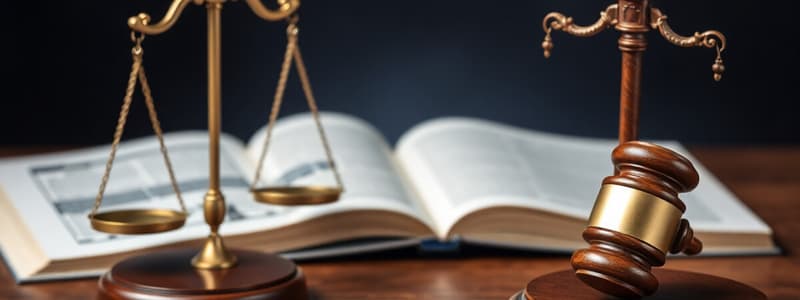Podcast
Questions and Answers
Which of the following is NOT considered a primary objective of criminal law?
Which of the following is NOT considered a primary objective of criminal law?
- Deterrence
- Rehabilitation
- Compensation (correct)
- Retribution
What is the minimum imprisonment duration typically associated with felonies?
What is the minimum imprisonment duration typically associated with felonies?
- More than 1 year (correct)
- 1 year
- Up to 6 months
- 2 years
Which element is NOT required to establish a crime?
Which element is NOT required to establish a crime?
- Financial Loss (correct)
- Causation
- Mens Rea
- Actus Reus
Which classification of crime involves the least severe offenses?
Which classification of crime involves the least severe offenses?
In a criminal defense strategy, what does the claim of 'insanity' suggest?
In a criminal defense strategy, what does the claim of 'insanity' suggest?
What does the term 'public order crimes' refer to?
What does the term 'public order crimes' refer to?
During which phase does a prosecutor formally accuse a defendant?
During which phase does a prosecutor formally accuse a defendant?
Which type of crime typically involves force or the threat of violence?
Which type of crime typically involves force or the threat of violence?
Flashcards are hidden until you start studying
Study Notes
Definition of Criminal Law
- Body of law that regulates conduct deemed harmful to society.
- Establishes offenses and prescribes punishments.
Objectives of Criminal Law
- Deterrence: Discouraging individuals from committing crimes.
- Retribution: Punishing offenders to provide a sense of justice.
- Rehabilitation: Aiming to reform offenders.
- Restoration: Repairing harm done to victims and communities.
Classifications of Crimes
- Felonies: Serious offenses (e.g., murder, robbery) with severe penalties (over one year of imprisonment).
- Misdemeanors: Less severe offenses (e.g., petty theft) with lighter penalties (up to one year of imprisonment).
- Infractions: Minor violations (e.g., traffic tickets) typically punishable by fines.
Elements of a Crime
- Actus Reus: The physical act or conduct that constitutes a crime.
- Mens Rea: The mental state or intent behind the act.
- Causation: The connection between the act and the harm caused.
- Harm: The actual damage inflicted on a person or property.
Types of Criminal Offenses
- Violent Crimes: Crimes involving force or threat (e.g., assault, homicide).
- Property Crimes: Crimes that infringe on a person's right to own property (e.g., burglary, theft).
- White-Collar Crimes: Non-violent crimes committed for financial gain (e.g., fraud, embezzlement).
- Cyber Crimes: Crimes involving computers or networks (e.g., hacking, identity theft).
- Public Order Crimes: Offenses that disrupt societal norms (e.g., disorderly conduct, drug offenses).
Criminal Defense Strategies
- Innocence: Claiming the defendant did not commit the act.
- Insanity: Arguing a lack of mental capacity to understand the act was wrong.
- Self-Defense: Justifying the act as necessary to protect oneself from harm.
- Alibi: Providing evidence that the defendant was elsewhere when the crime occurred.
- Entrapment: Claiming the defendant was induced to commit a crime they would not have otherwise committed.
Legal Process
- Investigation: Gathering evidence by law enforcement.
- Arrest: Taking a suspect into custody.
- Charges: Prosecutor formally accusing the defendant.
- Arraignment: Initial court appearance where charges are read.
- Trial: Examination of evidence and witnesses if plea negotiations fail.
- Sentencing: Court determination of punishment if found guilty.
- Appeal: Request to a higher court to review the case for errors.
Legal Principles
- Presumption of Innocence: Every person is innocent until proven guilty.
- Burden of Proof: The prosecution must prove the defendant's guilt beyond a reasonable doubt.
- Double Jeopardy: A person cannot be tried twice for the same offense.
Importance of Criminal Law
- Maintains public order and safety.
- Protects individual rights and freedoms.
- Reflects societal values and norms.
Definition of Criminal Law
- Regulates conduct considered harmful to society and establishes offenses.
- Prescribes corresponding punishments for those offenses.
Objectives of Criminal Law
- Deterrence: Aims to prevent crime by discouraging potential offenders.
- Retribution: Ensures justice by imposing penalties on offenders.
- Rehabilitation: Focuses on reforming offenders to reintegrate them into society.
- Restoration: Seeks to mend the harm inflicted on victims and communities.
Classifications of Crimes
- Felonies: Serious crimes like murder and robbery, often resulting in imprisonment exceeding one year.
- Misdemeanors: Less severe offenses such as petty theft, typically punishable with up to one year of jail time.
- Infractions: Minor violations, commonly subject to fines (e.g., traffic violations).
Elements of a Crime
- Actus Reus: The physical act that constitutes a crime.
- Mens Rea: The mental intent or state of mind behind the action.
- Causation: Establishes a direct link between the act and the resultant harm.
- Harm: Refers to actual damage inflicted on individuals or property.
Types of Criminal Offenses
- Violent Crimes: Involve force or threat, such as assault or homicide.
- Property Crimes: Violate ownership rights, including burglary and theft.
- White-Collar Crimes: Financially motivated, non-violent crimes such as fraud and embezzlement.
- Cyber Crimes: Offenses involving computers or networks, including hacking and identity theft.
- Public Order Crimes: Disrupt societal norms, e.g., disorderly conduct or drug offenses.
Criminal Defense Strategies
- Innocence: Asserts the defendant did not commit the alleged crime.
- Insanity: Claims inability to understand the wrongdoing due to mental incapacity.
- Self-Defense: Justifies actions taken to protect oneself from immediate harm.
- Alibi: Provides proof that the defendant was in a different location at the crime's occurrence.
- Entrapment: Argues that the defendant was coerced into committing a crime they would otherwise not have committed.
Legal Process
- Investigation: Law enforcement collects evidence related to the crime.
- Arrest: Detaining a suspect by law enforcement officials.
- Charges: Formal accusation against the defendant by the prosecutor.
- Arraignment: Initial court session where charges are presented.
- Trial: Court procedure for evaluating evidence if plea deals fail.
- Sentencing: Court's decision on punishment following a guilty verdict.
- Appeal: Process for seeking review of the case by a higher court if errors are suspected.
Legal Principles
- Presumption of Innocence: Ensures individuals are considered innocent until proven guilty.
- Burden of Proof: Prosecution is required to establish the defendant's guilt beyond a reasonable doubt.
- Double Jeopardy: Protects individuals from being tried multiple times for the same offense.
Importance of Criminal Law
- Essential for maintaining public order and societal safety.
- Protects the individual rights and freedoms of citizens.
- Reflects and enforces societal values and cultural norms.
Studying That Suits You
Use AI to generate personalized quizzes and flashcards to suit your learning preferences.


